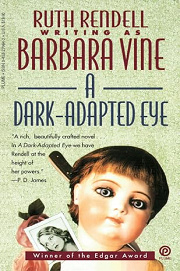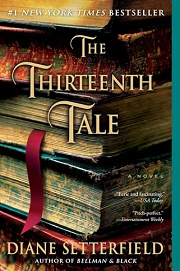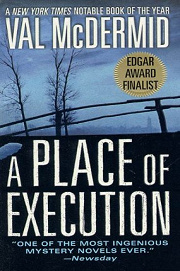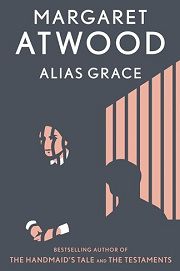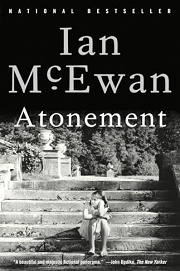Share your thoughts in a quick Shelf Talk!
A Dark-Adapted Eye by Barbara Vine
A long-buried family secret resurfaces, drawing two sisters back through a past stitched with careful lies and impossible loyalties. A Dark-Adapted Eye is an elegant, unsettling mystery that reveals how truth changes shape in the shadows.
Have you read this book? Share what you liked (or didn’t), and we’ll use your answers to recommend your next favorite read!
Love A Dark-Adapted Eye but not sure what to read next?
These picks are popular with readers who enjoyed this book. Complete a quick Shelf Talk to get recommendations made just for you! Warning: possible spoilers for A Dark-Adapted Eye below.
In A Dark-Adapted Eye, did you enjoy ...
... a narrator excavating long-buried trauma to make sense of a present-day crime?
In the Woods by Tana French
If what gripped you in A Dark-Adapted Eye was Faith Severn’s intimate, probing voice as she revisits her aunt Vera Hilliard’s execution and the family’s carefully preserved respectability, you’ll be drawn to Rob Ryan’s confessional account in In the Woods. Like Faith, Rob circles a childhood event he can’t fully trust his memory about, and as a new murder unfolds, his psyche—much like Faith’s slow realization about the truth behind Vera and Eden—becomes the real terrain of the mystery. The case, the past, and the narrator’s own blind spots entwine until the emotional and psychological cost is undeniable.
... a past-and-present inquiry that peels back a family's secrets layer by layer?
The Thirteenth Tale by Diane Setterfield
You liked how Faith’s recollections, old clippings, and conversations with a true‑crime writer gradually reframed Vera Hilliard’s story; The Thirteenth Tale uses a similarly layered structure. As biographer Margaret Lea untangles reclusive novelist Vida Winter’s history, each confession reorders what you think you know, much as the revelations about Vera and Eden’s rivalry keep shifting the ground under Faith. It’s that same careful, time-hopping unwrapping of a family’s buried truths that pays off in a final, haunting illumination.
... the meticulous, decades-spanning unmasking of a notorious crime?
A Place of Execution by Val McDermid
If you were compelled by the slow, inexorable uncovering of what really happened between Vera and Eden—prompted years later by a writer reopening the case—A Place of Execution delivers that same deliberate, tightening spiral. McDermid follows a 1960s disappearance investigated by a young detective, then revisits it decades on through a journalist’s lens. The way each new detail recontextualizes the past echoes Faith’s step-by-step dismantling of her family’s narrative and the chilling final turn that forces you to rethink everything.
... a complex woman at the center of a scandalous historical murder?
Alias Grace by Margaret Atwood
Vera Hilliard’s presence dominates Faith’s life and the family’s mythology; Alias Grace gives you a comparably formidable woman in Grace Marks. Through interviews and fragments, Grace’s intelligence, opacity, and quiet power draw you in, just as Vera’s poise and severity do across Faith’s memories. The novel interrogates class, gender, and culpability—much like the undercurrents that shaped Vera and Eden—while keeping you riveted to a woman whose guilt, innocence, and agency are never simple.
... a memory-haunted account that withholds and reshapes the truth of a family's tragedy?
Atonement by Ian McEwan
Faith’s reconstruction of the past—angled by loyalty, shame, and what she can’t quite face—mirrors the way Atonement lets Briony Tallis control and revise the story of a single night that destroys lives. Like the final reveal about what truly lay behind Vera’s crime, McEwan’s late revelations force you to reassess earlier chapters and the narrator’s authority. If you prized the tension between memory and truth in Faith’s telling, this will hit the same nerve with equal elegance and devastation.
Unlock your personalized book recommendations! Just take a quick Shelf Talk for A Dark-Adapted Eye by Barbara Vine. It’s only a few questions and takes less than a minute.
